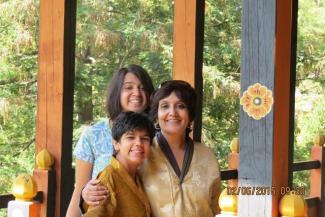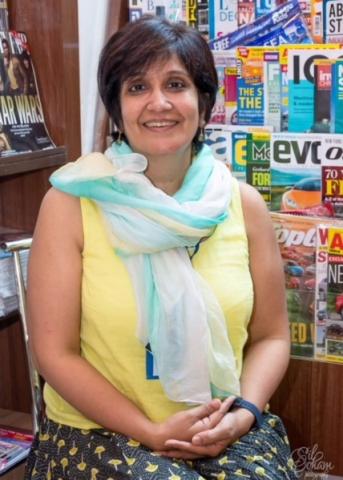
Jyotsna Kumar, was living with Sensiro Neural Deafness. But the birth of her child with congenital heart defect and cerebral palsy changed her priorities in life.
Jyotsna, tell us about your condition.
I was diagnosed with Sensiro Neural Deafness in 1997, I was 30 years old then.
What were the early symptoms?
During my childhood I never took annual audiograms and remained unaware of what impact anything could have had on my nerves considering the fact that my mother and most of my maternal side had the SN deafness. Tinnitus was often dismissed. Once my daughter was born my husband noticed or felt I was hearing less and instead of dismissing it as absent mindedness asked me to get a checkup done. It unraveled from there on. The only memory, I carry of that doctor’s visit was my instant response to the doctor. I told him “Whatever happens, ‘I need to hear my daughters voice always’. My daughter was 2 years old at the time.
Is there a history of sensorineural deafness in your family?
Yes, my mother and many relatives from my maternal side have it.
Painkilllers that I took during my adolescence years for menstrual cramps (such as baralgan, novalgin, spasma proxyvon) were nerve damaging and ototoxic (damaging to the ears). I had limited awareness and the doctor prescribed these often.
During my working life I was also exposed to loud noise when I worked at the airport. With a tendency towards this deafness there were many things I simply wasn’t aware of ..
So yes painkillers , working in noisy environments ... were all aspects that weakened my nerves
Please describe your experience of managing your condition:
I’ve reached a profound loss of 105 dB in both my ears. I wear digital hearing aids 16-17 hours a day. I can’t manage daily life without them. I do lip read but it works in tandem with hearing aids too. Means I do both together- use my ability to lip read as well as rely on my aids. I never understand accents :-( so if you are speaking clearly and in English I hear you. Lip reading is a coping strategy I acquired.
I use an I-phone that works with my hearing aids and through Bluetooth, the music or the phone call streams in. Here again, clarity is not guaranteed but it helps. I am not much of a phone person either. I have noticed, that if I just paused without getting frantic about not hearing, I am able to capture the essence of the unheard bits and don’t feel so frustrated then.
What were some of the challenges you faced and what is your advice to patients who face similar challenges?
Deafness is invisible yet real! Using hearing aids, working in tandem with one’s audiologist and a willingness to be open about one’s deafness helped me a lot. Seeking help was a big leap for me.
Have you learnt anything in managing in your condition that you wish you knew before?
Well to avoid any allopathic medicine unless absolutely necessary and from a spiritual angle, always be willing to listen. I believe in the mind-body connect, so over the years I’ve also worked on the emotional causes behind my deafness.
What resources are available to you in your city to help you manage the condition?
I am independent, but rely on my husband for bank work etc. where I’m afraid I won’t hear the bank teller. Resources are available in Pune, but if you cannot hear, you cannot hear.
I see my audiologist for fine tuning of my hearing aids
Have you had to make some changes to your lifestyle because of your condition?
Yes I avoid noisy places and loud music. What I miss is watching movies in movie theatres and group conversations. Having become deaf much after I had been exposed to language made me miss what I could not hear- music, lyrics, bird song, even the doorbell. I missed the nuances of conversations in groups, jokes went over my head or should I say ears—it felt like a terrible irreplaceable loss in some way.
Have you tried complementary medicine or therapies, like homeopathy or yoga?
Yes, yes, yes to all of it and they are an integral part of my healing processes. I use Bach flower as needed. I’ve progressed naturally to a more holistic path in life, and am not sure how it happened.
Has it been difficult emotionally to cope with your condition?
Yes the isolation is hard to explain. My journey, post-diagnosis has been filled with ups and downs. I went through the process of buying hearing aids, countless visits to the audiologist to treat an inflamed ear canal (due to the moulds), fine tuning of hearing aids for different settings etc. This was in the 1990’s where technology to do with hearing instruments was still in its nascent stage. I did allow my deafness to get to me, allowed it to isolate me although no one actually was. It felt like I was now shutting out the rest of the world.
How has your family supported you?
I have been immensely supported, and I actually laugh about my deafness with them.
Did you see a counselor for support? Were you offered counseling by doctor?
I sought counseling on my own, soon after my deafness was diagnosed. This was my first ever experience at seeking help and it made me understand how important it was to do so. It kick-started me on a process of unraveling, how much I was allowing my deafness to affect my daily life.
How did your friends treat you? Were you isolated?
I felt isolated, although no one actually made me feel that way.
What was the hardest part of the treatment? What kept you going? How has this changed your life perspectives and ambitions?
Accepting the fact that I had progressive nerve deafness was the hardest. It’s been a journey of sorts.
Last year, when I was told it is a105 db which means it was severe (the maximum being 120) and I may progress to a state where hearing aids don’t work, it did dishearten me but I did bounce back :)
I’ve learnt not to rush through life anymore. I cherish every sound I hear, from the bulbul’s song to my daughter’s voice. I started journaling, learnt to meditate and spend time in quiet nature.
My family has kept me going and an inner will and voice that makes me feel like I’m here with for a Higher Purpose.
I don’t treat my journey as a medical miracle or success. In fact, since I asked so many questions the doctors were quick to label me as ‘needs help’! Most of my journey with myself and my daughter (who has Cerebral palsy), has been about shattering stereotypes and beliefs we carry about medical professionals.
Tell us a bit about your daughter:
When I was 34 in 2001, my second daughter was born and on the 2nd day of her birth, she was diagnosed with a rare congenital heart defect –transposition of the great arteries (TGA) with VSD and ASD. We were told her chances of survival were bleak. She survived despite every single medical diagnosis indicating that she wouldn’t but she didn’t survive without damage.
She was just 1.1 kilos, when she came home. She was C arched, had no movement in her limbs, fists tightly shut, but her eyes revealed a determination. Her diagnosis was cerebral palsy (spastic diplegia). Her heart needed care, so did her lungs that had been damaged. Her body was filled with scars with all the tubes and IV drips. And I was a tired mother now on a mission to help my child. At that time, I didn’t have a cell phone nor did I have access to a support group or Google to search for answers. I had our Pediatrician who stood by us like a pillar guiding us, advising us and helping us more than what he was supposed to do.
The next phase of my life began as a mother of a special needs child; daily neuro-development paediatric therapy, speech therapy, occupational therapy, sensory integration…amidst all her tests for her heart, brain, hearing, sight etc.
Hospitals are the worst for the deaf
I won’t say I forgot my own disability but it took a back seat because my daughter was important. Hospitals are the worst for the deaf. Masked mouths meant I couldn’t lip read. I recollect the cardiologist telling me, ‘OH but you don’t look deaf!”. But I was and I was managing with what I could and my husband’s endless support.
The labels we carry when we have a disability are several. While I was termed Super mom, my daughter carried and still carries too many labels for me to list here.
She was non-verbal for many years. She never crawled or achieved major milestones. Doctors told me she would never walk. She did. In short she defied all odds. We as parents, did what we could within the medical framework of early sustained intervention via therapies, follow-ups, home programs and homecare.
Like me, my daughter carries her disability with her and is learning to manage it in her daily life rather than allowing it to defeat her.







